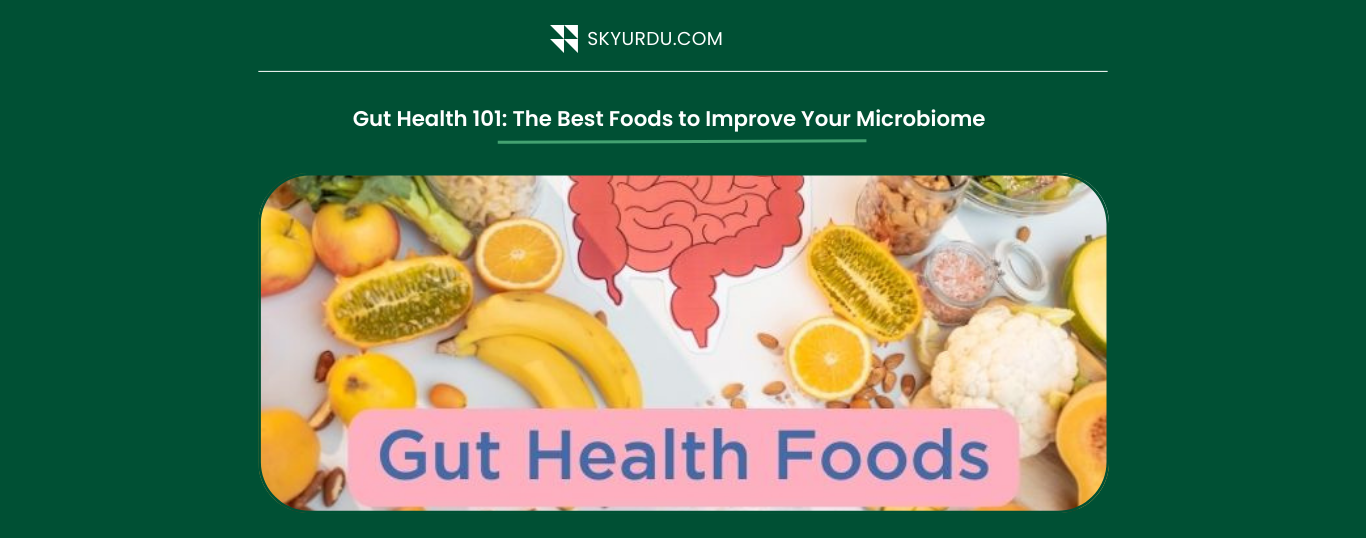Over the last decade or so, the overall health of one’s gastrointestinal tract has become the new frontier of wellness and nutrition. The term ‘gut microbiome’ is progressively more often used as science reveals how our gut bacteria affect almost every aspect of our health. But before we talk about how it is possible to make the right change to our diet that will positively affect our gut microbiome, let me explain what the gut microbiome itself is. In the current article, we shall consider some of the basic considerations on gut health and also identify foods that are good for the gut.
What is the Gut Microbiome?
The gut microbiome is an aggregate of trillions of microbial inhabitants of the human intestines, including bacteria, virus, molds, fungus and others. These micro organisms are essential in determining our general health. They aid in digestion, synthesize certain vitamins, modulate the immune response and even may affect emotions and/or behaviour.
The Role of the Gut
Maintaining a healthy gut is vital for several reasons:Maintaining a healthy gut is vital for several reasons:
1. Digestion and Nutrient Absorption: A healthy gut, as we know it, helps in the breakdown of food and assimilation of food products. If gut health is not well, then acquisition of nutrients from the food may be difficult as it will be malabsorbed, leading to deficiencies.
2. Immune System Support: For this reason, approximately 70 percent of the human immune system is located in the digestive tract. It is for these reasons that a healthy microbiome of the human body contributes to the moderation of immune response, and in the process, eliminate dangerous pathogens while at the same time taming inflammation.
3. Mental Health and Mood: The gut – brain axis is a network of interactions between the gut and the central nervous system. A healthy gut gives out neurotransmitters such as serotonin which is utilized widely in regulating mood swings. Dysbiosis – a shift in the microbiota, is linked to other mental disorders such as anxiety or depression.
4. Weight Management: It has been ascertained that gut flora play a certain role in metabolism and fat accumulation. But the studies that have been done link a balanced microbiome to weight and any imbalance in gut microbiome may lead to obesity.
The Best Foods to Improve Your Gut Health
There is a close interrelation between the diet and gut microbiota. Here are some of the foods that help create a healthy environment in the gut
1. Probiotic-Rich Foods
They are products containing viable and active microorganisms that, when ingested in adequate quantities, confer a health improvement to the consumer.
– Yogur: Select the yogurt that has no added sugar and contains active cultures. The particular beneficial addition of Greek yogurt is that it comes with higher amounts of proteins and probiotic compound.
– Kefir: It is also believed to have healthy bacteria often referred to as probiotic and has a sour taste. Kefir is also rich in many bacteria than yogurt, and therefore is a good probiotic food source.
– Kimchi: A traditional Korean dish, Kimchi is made from fermented vegetables, spice and has lactic acid bacteria that is good for the gut.
2. Prebiotic Foods
Prebiotics are specific forms of fibers which seep into your stomach and are consumed by the good bacteria. Foods rich in prebiotics include:Foods rich in prebiotics include:
– Garlic: Apart from flavors, garlic includes inulin that is a kind of prebiotic which promotes the growth of gut bacteria.
– *Onions*: Similar to garlic, onions contain moderates of inulin and other prebiotic that feeds the gut bacteria.
– Bananas: Bananas contain resistant starch that which are prebiotic fiber which fuels the good bacteria in the digestive system.
– Oats: Being a good source of soluble fiber known as beta glucan, oats are perfect for the nourishment of the good gut bacteria.
3. High-Fiber Foods
Soluble fiber is very important for the proper digestive system and the correct balance of the gut bacteria. High-fiber foods to include in your diet are:High-fiber foods to include in your diet are:
– Legumes: It’s rich in fiber, especially the beans, lentils as well as the chickpeas; which in turn acts as food to the bacteria in the gut hence enhanced digestion.
– Whole Grains: Whole grain products such as brown rice, quinoa and whole wheat products contain high amount of dietary fibre that is good for digestion.
– Fruits: Apples, pears and berries are highly rich in fibre especially pectin and it has an additive effect of sparking the growth of the good bacteria in our gut.
– Vegetables: Spinach, Kale, Carrots, sweet potatoes and many other green and root vegetables hence maintain high fiber diet and good digestion.
Read More… How to Apply Family Visa for Italy.
4. Polyphenol-Rich Foods
Polyphenols are types of plants that if consumed aid in stimulating the growth of good bacteria in the gut. Some polyphenol-rich foods to include are:
– Berries: Polyphenols content in blueberries, strawberries, and rasberry are good for intestinal Tract.
– Green Tea: Green tea contain catechins that are polyphenols, which has the ability to enhance the growth of healthy bacteria and also leads to the reduction of the dangerous ones in the gut.
– Dark Chocolate: Dark chocolate, and particularly the good quality one, contains polyphenols which can help in improving the composition of the gut bacteria and thus their beneficial flora.
Conclusion
Symbiosis of the gastrointestinal tract is one of the most important characteristics, which determine the result of all metabolic processes and even psychic. To this end, the diet of such organisms involves of probiotic containing, prebiotic and high-fiber foods.

I need work visa